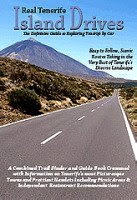 Part of the fun of travelling is about trying out the local cuisine, right? Maybe for most people but not for all.
Part of the fun of travelling is about trying out the local cuisine, right? Maybe for most people but not for all.Over the last week I’ve read and seen a few things which made me think about people’s approach to trying something different in food terms.
The first cases fit the classic profile of what the general impression is of some of the British holidaymakers who choose Tenerife as a holiday destination.
One comment I read more or less said, ‘because I’m in Tenerife doesn’t mean I have to eat Canarian food’. The other was the almost clichéd ‘I don’t want all that foreign muck’.
There’s a couple of points about these statements that are interesting (to me anyway). The first is that the people who said them clearly haven’t a clue what Canarian food consists of.
Much of it is very simply grilled meats (pork, lamb, steaks, chicken), or fish (a much more interesting selection if you’re a foodie) usually served with papas arrugadas (literally wrinkled potatoes) which are really just salty, boiled potatoes. You get the impression that any veg on the plate is there because the chef feels obliged to include some; it’s usually more like a garnish.
The point is that whilst it’s very nice it’s not exactly adventurous cuisine and I’m willing to bet that it isn’t a million miles from what these people who wouldn’t touch ‘foreign muck’ probably regularly eat for dinner (well maybe not the fish).
The second point that occurred to me was that these people weren’t typical of British people at all. Our lack of adventure in culinary terms is a bit of a myth. Otherwise why would our cities and even decent sized towns all have plenty of Indian, Chinese, Greek, Spanish, Lebanese, Italian, Turkish restaurants etc?
We’ve eaten with Spanish people twice over the last week. One meal was cooked for us, the other we cooked. One was simply grilled meats – no veg to speak of, the other was a Thai green curry with fish. Guess who cooked what?
In our experience, the Canarians eat predominantly Canarian food. Nothing wrong with that, but like the Brits quoted above it does betray a certain lack of adventure, or inquisitive nature about what other people around the world eat. And it isn’t just food. I had held an imaginary conversation in my head about the wine we brought to our friend’s meal because I just knew what would happen when we handed it over. The conversation panned out almost exactly as I had imagined it.
Andy had handed over the bottle and it was examined, almost suspiciously.
“Hmmm, this isn’t Spanish wine.”
“No, it’s South African. It’s very nice.”
“You don’t like Spanish wine?”
“Yes, but sometimes it’s nice to have a change…try something different.”

“Hmmm, Spanish wine is very good, try mine.”
He poured us a glass and opened the South African Pinotage and poured himself a measure.
“Hmmm, it’s not bad… but the Spanish wine is better.”
No surprise at that conclusion.
The next night we dished up the Thai curry to other Spanish friends. One of our guests eyed it suspiciously and after a few questions about what the ingredients were, she pushed it around her bowl for the next 20 minutes picking at it every so often. She hadn’t really eaten non-Spanish food before - something that doesn’t seem to be uncommon. I once heard a young Spanish couple in a Mexican restaurant in Puerto de la Cruz asking what Chilli con Carne was. Chilli has become a bog standard meal time favourite in the UK, as has many ‘foreign’ dishes. This isn’t the case here.
There are plenty of great restaurants on Tenerife and, apart from those in some of the southern resort areas, nearly every one of them has a traditional Canarian, or Spanish menu.




No comments:
Post a Comment